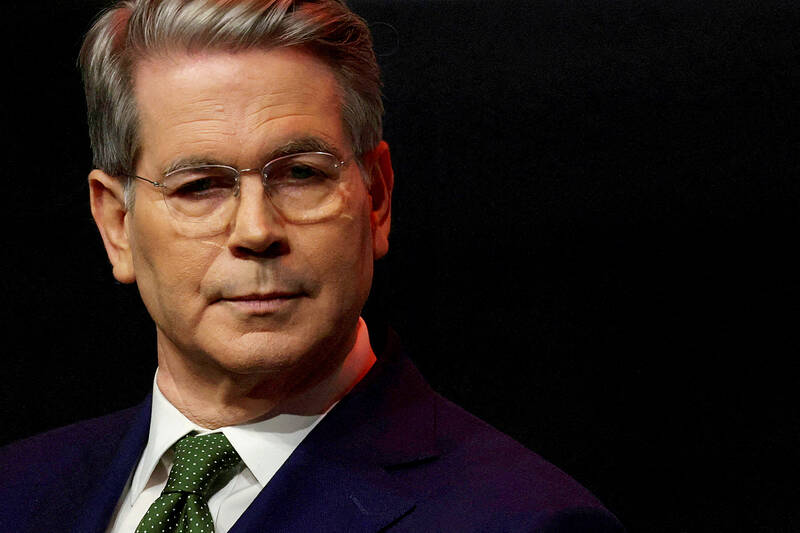US Secretary of the Treasury Scott Bessent said there’s the potential for advantageous trade deals with major US trading partners as foreign nations appeal to Washington for negotiations in the wake of US President Donald Trump’s steep reciprocal tariffs.
“I’ve seen the call list at the White House, and it’s substantial — we were having a discussion last night about which countries to prioritize,” Bessent said on CNBC yesterday. “I think you are going to see some very large countries with large trade deficits come forward very quickly.”
The Treasury chief reiterated that Trump will be directly involved in the talks, and suggested that the nature of the agreements would be something different than standard trade deals that focus on bringing down barriers to commerce.

Photo: Jeenah Moon, Reuters
Bessent flagged a potential energy investment deal in Alaska that he said could be attractive because it would involve foreign investment, a boost to US employment and an increase in exports rolled into one. Bessent also indicated not all the new tariffs may be rolled back.
“If they come to the table with solid proposals, I think we can end up with some good deals,” Bessent said of US trading partners. “And part of the calculus on that may be that some part of the tariffs stay on.”
Trump has “maximum negotiating leverage right here, right now,” Bessent said, with the reciprocal tariffs set to kick in today.
“We will see what our trading partners offer” as the negotiations get going, he said. “For instance, there is talk of a big energy deal in Alaska where the Japanese and perhaps the Koreans, perhaps the Taiwanese, would provide — would take a lot of the offtake,” he said, apparently referring to the potential for the three economies to purchase the resultant output.
They could also “provide financing for the deal, so that could be an alternative for them to come forward with that,” Bessent said. “Because not only would that provide a lot of American jobs, but it would narrow the trade deficit.”
On Monday, Bessent said Japan would be prioritized thanks to having come early to the US in seeking negotiations, and because of its importance as an American military as well as economic ally.

DIVIDED VIEWS: Although the Fed agreed on holding rates steady, some officials see no rate cuts for this year, while 10 policymakers foresee two or more cuts There are a lot of unknowns about the outlook for the economy and interest rates, but US Federal Reserve Chair Jerome Powell signaled at least one thing seems certain: Higher prices are coming. Fed policymakers voted unanimously to hold interest rates steady at a range of 4.25 percent to 4.50 percent for a fourth straight meeting on Wednesday, as they await clarity on whether tariffs would leave a one-time or more lasting mark on inflation. Powell said it is still unclear how much of the bill would fall on the shoulders of consumers, but he expects to learn more about tariffs

NOT JUSTIFIED: The bank’s governor said there would only be a rate cut if inflation falls below 1.5% and economic conditions deteriorate, which have not been detected The central bank yesterday kept its key interest rates unchanged for a fifth consecutive quarter, aligning with market expectations, while slightly lowering its inflation outlook amid signs of cooling price pressures. The move came after the US Federal Reserve held rates steady overnight, despite pressure from US President Donald Trump to cut borrowing costs. Central bank board members unanimously voted to maintain the discount rate at 2 percent, the secured loan rate at 2.375 percent and the overnight lending rate at 4.25 percent. “We consider the policy decision appropriate, although it suggests tightening leaning after factoring in slackening inflation and stable GDP growth,”

Greek tourism student Katerina quit within a month of starting work at a five-star hotel in Halkidiki, one of the country’s top destinations, because she said conditions were so dire. Beyond the bad pay, the 22-year-old said that her working and living conditions were “miserable and unacceptable.” Millions holiday in Greece every year, but its vital tourism industry is finding it harder and harder to recruit Greeks to look after them. “I was asked to work in any department of the hotel where there was a need, from service to cleaning,” said Katerina, a tourism and marketing student, who would

i Gasoline and diesel prices at fuel stations are this week to rise NT$0.1 per liter, as tensions in the Middle East pushed crude oil prices higher last week, CPC Corp, Taiwan (台灣中油) and Formosa Petrochemical Corp (台塑石化) said yesterday. International crude oil prices last week rose for the third consecutive week due to an escalating conflict between Israel and Iran, as the market is concerned that the situation in the Middle East might affect crude oil supply, CPC and Formosa said in separate statements. Front-month Brent crude oil futures — the international oil benchmark — rose 3.75 percent to settle at US$77.01